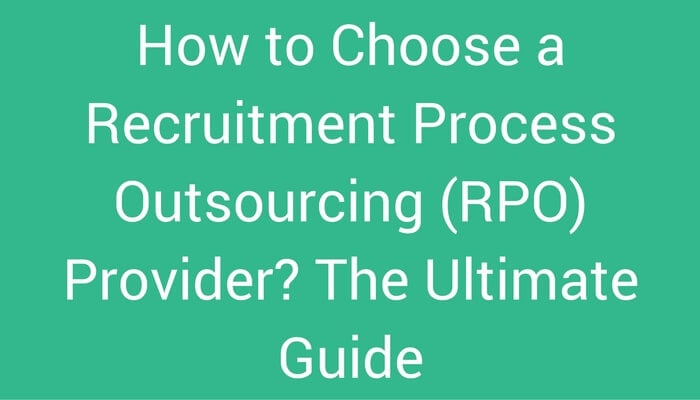- Days spent with position unfilled: 45
- Hours spent reviewing 200 resumes: Feels like forever
- Hours spent re-reviewing the 50 or so you didn’t toss straight in the bin: Too many to count
- Hours spent setting up interviews with ten semi-finalists: Don’t care anymore as long as they show up
- Hours spent on interviews: It feels like one long interview
- Hours spent on 2nd interviews with 3 finalists: More than enough
Knowing you could save all this lost productivity with the right RPO partner: Priceless
- What is Recruitment Process Outsourcing?
- Why is it necessary now more than ever?
- Who needs it?
- Is there a type of businesses RPO is good for?
- What departments in my company should I use an RPO for?
- How do the best RPO services do it right?
- How to build a relationship with an RPO?
- The top 10 RPO providers for small businesses
- Get on the RPO bandwagon
What is Recruitment Process Outsourcing?
Recruitment Process Outsourcing (RPO) is a process in which a business entrusts part or all of its recruitment process to an outside partner who specializes in hiring and retaining talent and can deliver superior results while saving the business money.
Outsourcing of hiring is of course not a new concept in itself, so we should start by stressing what RPO is not – it is NOT a quick-fix or a one-time deal, nor is it just a head-hunter or a staffing firm. For that you have old-school HR companies.
RPO is a way to streamline and improve your hiring processes for the long term, improving your overall business performance. RPO is also NOT a one-size-fit-all proposition. The RPO that is right for you will have specific expertise in your industry, and will customize a solution for your business based on your needs, strategic objectives, and your principals’ preferences.
Short of finding out your favorite song and dedicating it you over the radio, a good outsourcing provider should be able to fit itself to your desires, whatever they may be. An RPO can provide only management and direction for your business processes.
Or, if you feel like you don’t get to go the beach enough, it can take every the entire recruitment and employee management processes off your hands and off your premises. But only following in-depth consultation so as to achieve an optimal result for your business. Naturally, the more you want, the more it costs.
In a way, RPOs are to traditional HR companies what smartphones are to older cellular phones. You have to spend more time configuring your smartphone to your needs and preferences, but once you do, it keeps delivering new ways to make your life more efficient (or not, depending how much time you spend on Facebook…)

Why is it necessary now more than ever?
Back in the day, say 50-60 years ago, employment in the business world was far more stable. Many people worked in the same organization for life, or at least for long years at a time. Today the labor market is far more fluid, and hiring has become a constant and challenging facet of business operations. The gig economy is now more than just a buzzword: 56% of US workers are financially reliant on “gig” work and 42% of the US workforce consider themselves “casual” employees.
Streamlining your business’s recruitment procedures can not only save you money and productivity on the selection process itself, but also yield lower turnover and higher-performing selections for your openings. Thus the work of a good RPO partner keeps saving you money throughout the new employee’s service in your organization, and not just when they’re hired.
Who needs it?
Everyone. No, seriously, almost any business that hires more than a handful of people a year. Again, there are different facets that an RPO can perform so every business can choose what functionality they require.
Are you having trouble finding just the right people to fill your open slots?
A good RPO provider is active and hands-on. They don’t just put out an ad for you and field the applications, or even just screen the applicants for you. The right RPO will know your industry so well that they can find passive candidates who are a great fit at your organization. Your RPO will target these people individually rather than just putting up an ad and seeing who answers it.
Are you in a specialized industry that requires very specific expertise?
Again, your well-chosen RPO will be well-versed in your industry, and will be able to screen applicants far beyond checking off the right software under “computer skills” in the resume. It will take care of background checks, drug testing and whatever else is needed. It will make sure that all the applicants it submits to you for final consideration have the specific skills and passion required to make you an industry leader.
In other words, you won’t need to train an internal HR rep. or try to hire one with industry specific experience. Instead, you get access to HR experts who have industry specific experience but you will need to let go of a handsome monthly retainer.
Is your business going through a growth phase?
Oh boy. Nothing like finally making it big and getting tons of orders only to fail because your staff couldn’t keep up. Your RPO partner will help with the human side of the expansion, making sure that you get the right talent, get it fast, and can keep making more and more product rather than screening applicants.
Do you employ lots of temporary workers and contractors?
If so, RPO is definitely for you. Your RPO partner will streamline your hiring and offloading process so that it is handled in an efficient, uniform manner, saving costs, increasing budget clarity and transparency, and creating a much better engagement process – leading to improved reputation in the labor market which will attract better talent.
Do you wish to improve your employment brand so as to attract better talent?
Maybe your company is new and has yet to acquire the brand appeal that makes the best and the brightest stop scrolling past your job posting. Maybe previous practices have led to your organization having a poor reputation as a good place to work, and you’re looking to fix that.
An RPO helps you maintain better relationship with both prospective employees – even the ones that don’t get hired for your opening – and former ones, which improves your brand among the people you need to attract. Any of these circumstances makes RPO an option you should definitely consider.
Is there a type of business is RPO good for?
It depends on your size and not on your field. Whether you’re in food and bev. or are creating the next killer app, if you still have only five or fifty or even a few hundred employees, then using an RPO might not be worth the effort it takes to pick the right partner and iron out the details of the cooperation, nor the expense involved.
But if your business hires and replaces dozens, hundreds, thousands or more employees each year, be it in a traditional industry like clothing or food, or on the cutting edge of technology and anything in between, the right RPO can cut your costs, cut your employee turnover and help power you to success.
What departments in my company should I use an RPO for?
There is no single answer to this question, but a good RPO partner should work together with you to decide. For some, the best thing is to hand over the entire hiring process to the outsourced partner, and wait for a shortlist to be submitted (in some cases the outsourcing company will even entrust some final hiring decisions to the RPO but that usually only happens after you’ve had a long term relationship).
Other companies may decide that due to the nature of the positions to be filled, and the working relationships, the applicant would have to cha with a few team members. It’s probably wise to have the screening and interviews conducted by company staff, leaving the RPO partner to provide an overall direction and ensure recruiting efficiency.
In general, the more specialized and skilled the position you need filled, the greater the benefit of using an RPO becomes. That said, even when the positions needing to be filled are less skill-intensive, an RPO can help greatly if the number of positions is sufficiently large.
How do the best RPO services do it right?
They know recruiting
No duh, right?! But hiring the right people for the right job is its own expertise. If you’ve tried doing it yourself then you know it’s not as easy as it looks. So we’ve established that it requires expertise but that same or similar expertise can be offered by your in-house HR.
The difference is your RPO partner will be judged solely on how well the new employees work out for you and how quickly and cost-efficient they can make the process happen. And, if they don’t deliver, they’re easily replaced by another vendor. RPOs know this and the good ones will act accordingly.
They know your field
We love Debbie and Greg from HR. They’re awesome but they don’t know all the ins and outs of the latest must have skill sets. That isn’t where their expertise lays. The same goes for the nice person at the generic HR company. Jennifer, your COO, does know what’s required of an applicant but any time she spends on hiring is time she’s not doing something else.
Your RPO partner is good at both. They know the technology, and the players, and the training grounds, and the networks. They know the compliance and licensing requirements for each position. This is all they do.
It may be a small RPO company that specializes in your field, and it may a “big-box” RPO that has many recruiters – one of whom is so knowledgeable about your needs that she could easily fill a high position in your organization herself, but happens to be happier helping you find someone even better for the job.
You know how sometimes a recruit totally has the skills, but somehow doesn’t fit in? Your tech-savvy manager might miss that but the right RPO won’t. They take the time and effort to understand the work environment the recruit will have to thrive in, and they have the distance to be objective about it.
The last thing you want, when you’re making that expansion into the big leagues, is to discover you’ve assembled a team who each look good on paper, but don’t mesh as a team. Your RPO will take that into consideration and make sure your new 100 or 1,000 employees all hit the ground running in the same direction, rather than into each other and your more veteran staff.
They customize
Your company is unique. If it wasn’t, you’d be out of business. Your needs are also unique, and no cookie-cutter approach to your hiring needs is going to get you the best results you deserve. The right RPO will take the time to form an in-depth understanding of your needs and preferences, and will formulate a plan that is just right for you.
If someone says after a 10 minute conversation that they have a plan ready for you, just sign here and here, they’re probably not the right choice. However, it’s a two sided coin. Some businesses will rush to sign a contract with an RPO just to get it over with and allow themselves to work on other things. Both sides should consider this relationship as a process and you need to progress through it together.
Like any significant relationship, it will take some initial time to build, but once it’s off the ground the benefits will be tangible, and the effort of upkeep will be lower and more streamlined budget-wise than trying to manage your recruiting in-house.
It’s worth repeating that it just like any relationship it takes two to tango – If you want to have a successful relationship with your RPO both of you need to be on the same track.
They know how to work in the locations you need
Are you expanding internationally? The different laws, regulations, customs and structures can be dizzying, especially when you’re trying to hire people from across the world. Your RPO partner will have the know-how in your target markets to make sure you spend as little time and money as possible assembling your new workforce, and get it as quickly as possible to producing more growth.
How to build a relationship with an RPO?
Carefully. Choosing an RPO is not like handing your car keys to the first parking valet that comes along, which you do on the assumption that anyone wearing the uniform can park your car just as well as they park all the others, even if yours is a particularly sweet ride. You have to choose the RPO that has proven knowledge and success in your specific field, that intimately knows the technology your recruits must be familiar with for each individual position, and that knows the unspoken rules of your industry and the traits that make or break a career therein.
Perhaps you are looking primarily at a one-time large expansion of your workforce, or conversely are looking to manage a large steady stream of hires and departures. Each of these situations will require a different approach and possibly a different partner.
The right RPO will be able to assign you a recruiter who knows your business, your competitors, and all the best graduates of the relevant departments and courses. They will be able to point out considerations in the hiring process that perhaps even you hadn’t thought of, and to manage the inevitable rejection of most applicants in a way that leaves them positively (or at least not negatively) disposed towards your brand name.
What to consider
The most important thing to consider is your needs. Are you more interested in pin-pointing a smaller number of employees for key positions, or are you concerned with mass numbers and cutting down turnover? Are you in a field where the key is specific technical know-how, or is it experience in the game?
How much of the recruiting process are you comfortable outsourcing? If you already have a well-staffed HR department, it might be more cost-effective to place them at the disposal of the RPO partner’s guidance. If you’ve just reached the size where you’re starting to need one, maybe you’ll be able to do with a smaller in-house staff that works in synergy with the RPO.
Once you have considered your own needs, you need to do your homework and see what your prospective RPO partner brings to the table, beyond what they’ll tell you yourself. Search the internet, talk to colleagues.
Do they have expertise in the type of tech proficiency you require, or in your pattern of temporary employment? Do they have a track records of meeting the specific needs you have identified for your organization? To paraphrase Sun Tzu’s “Art of War”, which is not just about war but any type of conflict, “Know yourself and know the other – A hundred victories in a hundred engagements”. Once you know what you need and what each RPO company can give you, the answer presents itself.
The Top RPO Providers for Small Businesses:
Consistently ranked #1 in value, which means it delivers Fortune 500 results for small-business budgets.
Has Fortune 500 clients, but works with clients as small as 100 employees as well. Excellent time-to-hire.
Ranked as the top mid-tier RPO by HRO Today in 2014.
10 years experience in this new field, Six-Sigma-based methodology and flexible packages for any need.
The old-school HR giant is evolving with the times, and is a major quality player in RPO as well.
Specializing in hires of 50-500 employees, they could be the perfect choice for your small business taking the next step up the ladded.
Possibly the best customizers in the business, with the ability to get you large number of the most esoteric specialists.
A company that prides itself on staying up-to-date on the latest tech and tools, so you’re not fighting today’s battles with yesterday’s weapons.
An industry leader with a conscience. People Scout places more veterans than any other RPO company.
Get on the RPO bandwagon
RPO is an exploding industry, which is because companies small and large have seen tremendous benefit short and long-term from engaging its innovative approach. While not every RPO is right for every organization, companies from a few hundred employees to multinational Fortune 500 giants have profited by using one. For a small business, the right RPO partner can in fact be the springboard into a not-so-small-anymore business, which is what we all want.
RPO is not a magic wand, nor a one-time fix, but a new way of doing business that lets your new partners do what they’re good at, which is any and all facets of hiring and retaining, and frees you and your team to concentrate on your actual work.
Using an RPO is a strategic decision, and as such requires careful consideration and eventual internal consensus. Once that is achieved, the search for the right RPO partner can begin. Once you find that, and the initial mutual adjustment takes place, you can sit back and enjoy the smoother purring of your corporate race car, as it stops spending so much time in the hiring pit and begins to lap the field and overtake the competition.

